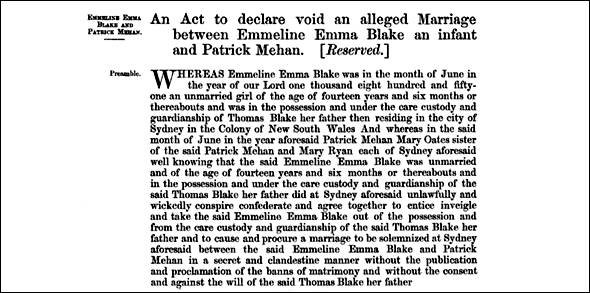Private laws elsewhere
It rarely fails.
The Legal Genealogist hardly finishes a blog post without the inevitable inquiry… the question that should have been anticipated.
Yesterday’s blog about private laws1 was no exception.
Almost immediately, a friend from Down Under asked a question I should have anticipated.
Do private laws exist elsewhere, outside of the United States?2
Answer: Yes.
Now, I’m only going to mention a couple and only in Common Law countries. The Civil Law system — common in continental Europe and South America — is a very different legal system and I frankly don’t think it lends itself to private laws.3 But I’d look for this kind of thing anywhere, and especially in Common Law countries.
First, a reminder: public laws are laws that are written to impact everyone. Private laws are passed for the benefit of a single individual, group of individuals or a family or, in many cases, a business concern — even a church.4 So a law that says what taxes must be paid or a law that requires us to wear seatbelts in our vehicles would be a public law, while a law placing a widow on the pension rolls when she couldn’t prove her full eligibility or allowing a business to incorporate in a particular way would be a private law.
So… these were common in the United States, as noted yesterday. But they weren’t unique to the United States.

You’ll find private laws in the United Kingdom as well, where the Parliament itself notes that: “In the 19th century, a majority of legislation passed by Parliament was private business. The principal categories were public works and transport schemes (railways, waterways and harbours), permissions for divorce, and the settlement of estates. Today, the last of these is rarely required; and the need for the first two has been all but removed by the Transport and Works Act 1992, and the Marriage (Prohibited Degrees of Relationship) Act 1986. Private bills today are mainly promoted by local authorities and other public bodies, seeking extensions to their powers.”5
An accompanying report adds that: “The most recent ‘personal’ legislation, where Parliament gave permission to marry to a particular couple, was passed in 1987,”6 when a father-in-law and daughter-in-law were given the right to marry.
So… looking for that divorce in England before 1858? Or that special permission to marry for a couple too closely related by blood or marriage? You have to look in the Parliamentary records.
There were also private laws for things like divorce cases that you’ll find in the private laws of Canada, starting as early as 1839 and accelerating when an 1867 statute gave authority over divorce to the Parliament there.7 You’ll find names of people put on the pension lists as well: Mrs. Caroline McEachern; Janet Anderson; Mary Hodgins and three children.8
In Australia and New Zealand, most non-public acts appear to be more on the business and local government side — but not entirely so. Called local, personal or private acts, they might include:
• Australia: Although “reserved and never assented to” (not enacted), there’s an entertaining 1853 private law “to declare void an alleged Marriage between Emmeline Emma Blake an infant and Patrick Mehan,” alleging that Mehan, his sister and a third person “did … wickedly conspire” to have a secret marriage performed between the two.9
• New Zealand: validating marriages solemnized by Reverence Francis Tripp of Saint John’s Church at Wakefield in the Province of Nelson after doubts arose as to compliance with 1854-58 statutes.10
• New Zealand: a private law to allow the trustee and devisee of a will to join with other heirs to take action on land inconsistent with the terms of the will.11
Bottom line: private laws are not just a U.S.-legal rabbit hole. They exist in many places, particularly in Common Law countries — and we should look for them everywhere our ancestors may have lived.
Cite/link to this post: Judy G. Russell, “International legal rabbit holes,” The Legal Genealogist (https://www.legalgenealogist.com/blog : posted 21 Mar 2019).
SOURCES
- Judy G. Russell, “Down the legal rabbit holes,” The Legal Genealogist, posted date (https://www.legalgenealogist.com/blog : accessed 21 Mar 2019). ↩
- Facebook status comment posted by Helen Connor to Judy G. Russell, 20 Mar 2019. ↩
- Of course, I’d be delighted to be educated on this by somebody who knows better than I do! ↩
- See “Public and Private Laws: About Public and Private Laws,” Government Publishing Office (https://www.govinfo.gov/). ↩
- “Private Bills in Parliament: House of Commons Background Paper,” House of Commons Library, www.parliament.uk (https://researchbriefings.parliament.uk/ : accessed 21 Mar 2019). ↩
- Richard Kelly, “Private Bills in Parliament: House of Commons Background Paper,” 2014, PDF, www.parliament.uk (https://researchbriefings.parliament.uk/ : accessed 21 Mar 2019). ↩
- John Alexander Gemmill, The Practice of the Parliament of Canada upon Bills of Divorce (Toronto: Carswell & Co., 1889), 17-20; digital images, Google Books (https://books.google.com/ : accessed 21 Mar 2019). ↩
- Schedule B, Chap. 41, 48-49 Vict., Acts of the Parliament of the Dominion of Canada, … 1885 (Ottawa : Brown Chamberlin, 1885), 76; digital images, Google Books (https://books.google.com/ : accessed 21 Mar 2019). ↩
- The Private Acts of New South Wales … (1832-1862) (Sydney : government Printer, 1863), 362-364; digital images, Google Books (https://books.google.com/ : accessed 21 Mar 2019). And here’s a wee challenge to my Down Under friends: whatever became of Patrick and Emmeline???? ↩
- No. 8, The Statutes of New Zealand, … 1869 (Wellington: Govt. Printer, 1869), 21; digital images, Google Books (https://books.google.com/ : accessed 21 Mar 2019). ↩
- §8, No. 40, The Statutes of New Zealand, … 1893 (Wellington: Govt. Printer, 1893), 173; digital images, Google Books (https://books.google.com/ : accessed 21 Mar 2019). ↩


